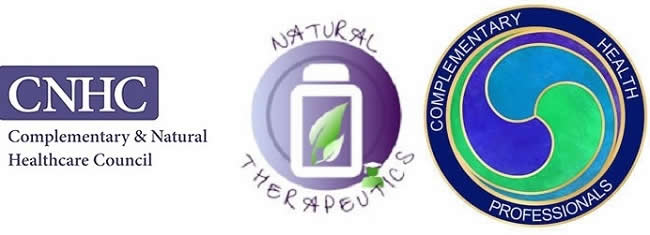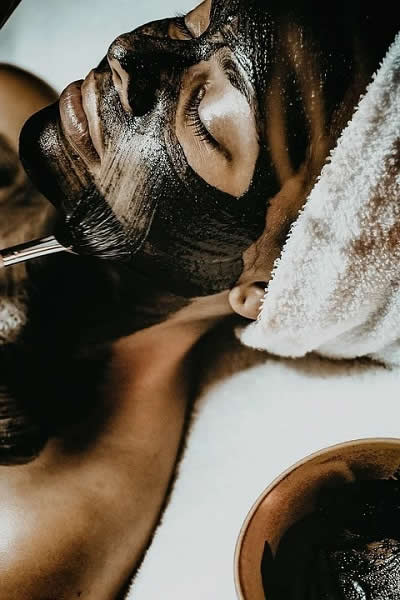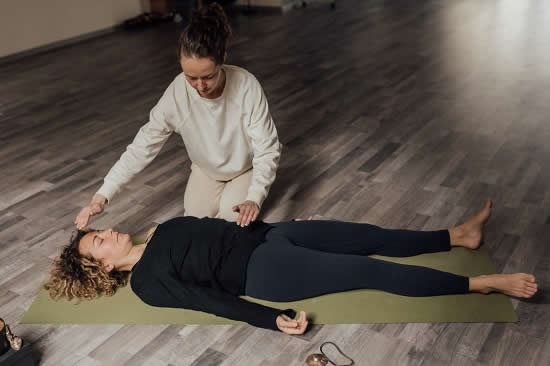Positive Health Online
Your Country

What is the Difference between Beauty and Complementary Therapy Qualifications in the Same Subjects?
listed in clinical practice, originally published in issue 272 - August 2021
As the registrar for Complementary Health Professionals (CHP), one of the UKs leading professional associations, we are reviewing qualifications every day. Not only do we check qualifications for membership for us, we also offer a service for non-members who wish to be registered with the UK’s voluntary self-regulatory body called the Complementary and Natural Healthcare Council (CNHC). Briefly, the difference between us is that the CNHC exists to protect the public whilst our role as an association is to support the therapist and further the work of our profession. The CNHC encourages all of its registrants to also be a member of a professional association (https://www.cnhc.org.uk/cnhc-and-professional-associations-0).

Logos (Left to Right for CNHC, Natural Therapeutics, CHP
The same thing exists in other healthcare professions and a good example is that of nurses who are regulated by the Nursing and Midwifery Council (NMC) but their association is the Royal College of Nursing (RCN). We are a multi-disciplinary association and cover all complementary therapies whereas the CNHC only covers 17 therapies. Over the past few months, we have been even busier than ever checking qualifications and people are clearly very confused. This is because unlike statutory regulated professions, such as nursing, our standards are not enforced. So even though we do have National Occupational Standards and agreed Core Curricula, there is nothing to stop poor quality online courses being sold and some insurance companies are only too happy to insure people despite not following what the profession has agreed is required to safeguard the public. This is detrimental for our profession as a whole and leaves people feeling cheated when they try and join professional bodies. However, the most problematic issue of late has been that people have completed beauty therapy qualifications in massage, aromatherapy, reflexology etc. that do not meet the required standards for CHP membership or CNHC registration and they become very upset. The problem is that the college where they trained did not explain what the course was when they enrolled, so they believe they are doing a recognised complementary therapy course. The problem is that they are doing a recognised course at a college but just in the wrong industry.
Spa Beauty Treatment by OlyaLole Courtesy OlyaLole Pixabay
What are National Occupational Standards (or NOS for short)?
I have actually been involved in this for a number of years and working on the Aromatherapy Council, we were the first complementary therapy to have published NOS. At that time, back in 1998, we were working with the Government Department called Skills for Health who were given the job of setting competency standards. You can read about the history of the aromatherapy NOS on the Aromatherapy Council website: https://www.aromatherapycouncil.org.uk/about_us
Now, there is a repository for all approved NOS at https://www.ukstandards.org.uk/ and you can view them in different sectors. If you look at the dropdown list under sectors, you will see that complementary and natural healthcare is a completely different sector from Hair, Barbering, Beauty, Nails, Wellness and Holistic services. The word holistic has often been misused in our industry too. As a clinical complementary therapist, I often get aggravated when say at the hairdressers I am asked what I do for a living and the reply is “Oh, I do holistics too”! When you look at the word holistic, it is a concept where the whole or integrated systems are viewed together rather than just their parts. In the 1980s when complementary therapies first started to become popular, this concept was included in courses because a complementary therapist looks at the whole person rather than just its parts. So, unlike in medicine where everything is compartmentalized, a complementary therapist has the time to look at the physical, emotional and mental health of an individual and also look at other aspects that affects their wellbeing, such as sleep pattern, diet, drinking habits, exercise, relationships, stressors etc. and address all of these elements together and then develop a treatment plan accordingly. Some therapists can also look at energies and chakra systems. When I take a consultation with a client, we can be talking for half an hour before I start the treatment so that I can ensure I am addressing all of their needs – taking the holistic approach. Therefore, it is a principle or an approach to treatment. Saying that you are a holistic therapist is describing the therapist as being more than the sum of their parts! You can say that you are a practitioner of holistic medicine as that makes sense but what you cannot do is put an s on the end of holistic and make it “holistics”. As an adjective, it cannot be made plural. For example, you might say “integrated medicine” but you cannot say “integrateds medicine”. It is true that some adjectives end up becoming nouns; however, strictly speaking, in English adjectives do not take plural endings.
Energy Practitioner Healing by Arina Krasnikova Pexels Courtesy Arina Krasnikova Pexels
So, what is clear is that our professions have become muddled and people have clasped onto words without understanding their meanings. The distinction between beauty therapy and complementary therapy is now blurred and this is unhelpful. In an ideal world, you should either be called a beauty therapist or a complementary and healthcare therapist. Both sectors are equally valuable in the services they offer, it is just that they are different. The beauty industry is involved with making you feel good and this enhances your wellbeing. It can also help wellbeing by helping you to relax. A beauty massage therapist will give you a lovely relaxing massage and the consultation will only be brief. This is the type of treatment you normally get at a salon or spa. A Massage Therapist in the complementary therapy healthcare sector will have trained differently and will have studied pathology as well as anatomy and physiology. Their skills will include working alongside medical professionals and they will be able to treat medical conditions and refer when necessary. Therefore, complementary therapists are healthcare professionals allied to medicine. This is what “complementary” means – something that is useful together and complementary therapies are useful alongside conventional medicine. We see complementary therapies now in hospitals and hospices and with level 5 and 6 qualifications available in massage, sports massage, reflexology and aromatherapy, these therapists are very highly skilled.
What to Look out for when Enrolling on a Course
This all depends on which profession you wish to be in and of course you could work in both if you want to. However, knowing exactly what you are enrolling on is very important, especially when you want to be recognized by the leading associations and/or regulatory authorities.
In the beauty therapy industry, the course outlines or syllabus will often be supported by the Hairdressing and Beauty Industry Authority (HABIA). This is the standard setting body for the Hair and Beauty Industry and as such, these courses are going to fall into the Beauty Therapy Sector. Colleges will offer massage/aromatherapy/reflexology etc. courses to promote relaxation. They are usually fairly short and you will not have to do many case studies. Instead of aromatherapy, you may learn to use pre-blended aromatic products. The levels can be level 2 or level 3 and at level 3, they are more likely to be a level 3 certificate rather than a level 3 diploma. Before you part with your money, go along to an open day and ask the questions about the course, who recognizes it and where it can lead.
In the complementary therapy sector, we require a minimum of a level 3 diploma. For the main therapies, the CNHC hold the agreed core curricula and you can actually view these online at https://www.cnhc.org.uk/cnhc-core-curricula. Many courses in complementary therapies are also offered at level 4, 5 and 6. They usually state on them that the course would qualify you for CNHC Registration or may be supported by one or more of the main professional associations. Again, ask the course provider about this information and check with the associations listed that they do recognize the course before you enrol. The case study requirement and total qualification time (TQT) is also much greater. For example, 60 case studies in aromatherapy with a TQT of 590 hours and in reflexology, 100 case studies and a TQT of 630 hours.
The complementary therapy industry does not recognize online only courses, especially for bodywork therapies but also for therapies such as reiki. Therefore, if you are thinking of doing a course that has no contact hours with a tutor and is not assessed in a classroom with an independent examiner, it will not be recognized, even if the company website tells you that it is accredited with an association. Sadly, not all associations are equal. There are blended learning courses where theory may be delivered online, but practical skills are taught in class and assessed and you really do need this in order to be proficient and be able to offer the best possible service to your clients. If you want a successful business at the end of all of this studying then do the best course you can afford, even if that means travelling further afield to study.
For CPD courses, you also need to be discerning. There are lots of courses out there and some are not value for money. CPD is more than just a tick box exercise to enable you to re-register each year with your association and should help you and your practice to grow and expand. So, one day courses with no assessment or case studies will not really give you value for money. Instead of doing lots of courses, specialize in a particular area and add to this knowledge each year. There are some great online theory-based courses that you can do for CPD, but again these need to be supported by a tutor with whom you have personal contact and should be assessed by them for competency and quality. In short – “Don’t sell yourself short”!
Recommendations for the Future
Moving forward, it would be helpful to everyone, and especially the public, if we just have two titles: Beauty Therapist and Complementary Therapist. As I said earlier, you could hold both titles and work in both industries but their individual qualities would be clearly recognizable and identifiable. The public would be able to distinguish what they are paying for too. Qualifications should be clearly labelled as being in one sector or the other. Organizations such as the General Council for Soft Tissue Therapies (GCMT), of which we are a member are looking at ways to help differentiate the quality of bodywork therapies in terms of qualifications and have recently set up a new working party that I have the honour of being a part of. It is important to find a way forward to help distinguish what training a professional has done – so watch this space. The public deserves to be able to discern the qualifications of their therapist is a similar way one would for a doctor or dentist.
If you would like any support with training or would like to join a progressive and supportive professional association, please do get in touch with us at enquiries@complementaryhealthprofessionals.co.uk
We do offer upgrade courses for anyone with an old qualification in complementary therapies in massage, aromatherapy, reiki and reflexology and can help you bring yourself up to date rather than paying out to retrain that can help you gain membership and/or CNHC registration. These can be facilitated remotely with online content and video conferencing but may require some face-to-face training or in-class assessment. Later this year, we will be launching our level 5 aromatherapy upgrade diploma. This is for aromatherapists with an existing level 3 diploma who wish to upgrade to level 5. Details for that will be available on my personal website www.naturaltherapeutics.co.uk.
Comments:
-
No Article Comments available

